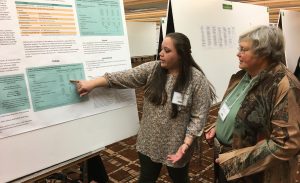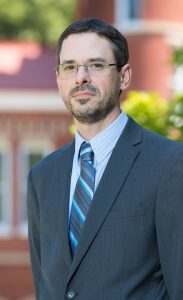
The W4001 project involves research on pressing demographic, economic, social and environmental challenges faced by rural communities, such as limited access to health care, education, broadband internet and jobs. Photo by Stefanie Goodwiller/UM Printing and Creative Services
OXFORD, Miss. – A University of Mississippi sociology professor and administrator is part of a multidisciplinary research team that has been awarded the National Excellence in Multistate Research Award from the Association of Public and Land-Grant Universities and the U.S. Department of Agriculture.
John Green, who is also senior research associate at the university’s Center for Population Studies and co-director of the interdisciplinary minor program in society and health, is among 39 investigators from 28 colleges and universities, spanning all regions of the U.S., who were honored. The team was awarded the Western Region Excellence in Research Award this summer.
The group received its latest recognition at the APLU/USDA national award ceremony, which was conducted virtually Wednesday (Oct. 28). This highly competitive award recognizes scientists who conduct exemplary research and outreach efforts across states and, in doing so, enhance the visibility of USDA multistate programs.
“Bringing together researchers from multiple disciplines, states and regions to investigate and address important challenges in rural America results in new insights and innovative development strategies,” Green said. “I have learned so much from my colleagues in the W4001 network, and that has helped to inform my work with partners across Mississippi.
“This award recognizes the value that is added through cooperation across the organizational and state lines that often divide us.”
The project, known as “W4001: Social, Economic and Environmental Causes and Consequences of Demographic Change in Rural America,” involves scholars who conduct research on pressing demographic, economic, social and environmental challenges faced by rural communities.
Rural areas make up 72% of the nation’s land area, are home to 46 million people and are essential to agriculture, natural resources, recreation and environmental sustainability. These areas are constantly changing and many face challenges, such as limited access to health care, education, broadband internet and jobs.
Events such as the Great Recession, the opioid epidemic and the COVID-19 pandemic have highlighted how such challenges can lead to major disruptions to the environmental, economic, social and physical well-being of rural communities. The team’s findings have contributed to numerous local, state and national policies that support rural sustainability and well-being, according to the project’s impact statement.
In just the last three years, the group has produced hundreds of peer-reviewed publications, developed numerous public briefs, secured more than $13 million in research funding, led workshops for community organizations, delivered more than 200 presentations to stakeholders – including the U.S. Congress and the National Institutes of Health – and consulted for experts in multiple state and federal agencies.
Kirsten Dellinger, a sociology professor and associate dean for diversity and inclusion in the College of Liberal Arts, attended one of the group’s meetings in Hernando.
“I witnessed a wide range of scholars, community leaders and other stakeholders energetically working around a large table, tackling major social challenges,” Dellinger said. “In that room, I saw the role that John played in bringing experts from the rest of the nation to Mississippi and the expertise in Mississippi to the rest of the nation.”
“This shows us what true collaboration can accomplish.”
In recent years, W4001 has provided research to inform responses to major national health crises, Green said. For example, this project has provided information about the effects of the COVID-19 pandemic on rural communities, guiding states’ social distancing policies, resource allocation, testing and reopening strategies.
The team’s research has also aided data development for anti-poverty policies, including recommendations for changes in official measurements of poverty and underemployment and the distribution of safety net resources. Such data may improve policy and programming responses to promote socioeconomic well-being, Green said.
Project members were the first to discover that rural populations are shrinking due to young adults moving to urban areas, fewer births and increased mortality. Researchers created a database that details county-level age-specific net migration trends, housed at the University of Wisconsin Applied Population Laboratory.
Hundreds of thousands of regional planners, insurance companies, school districts, senior housing developers, public health agencies and other stakeholders have used the database to understand rural needs and market demand and to inform infrastructure development and resource allocation.

Archive Photo: UM master’s student Katrina Alford (left) discusses her demographic research at the Southern Rural Sociological Association’s 2018 annual meeting in Jacksonville, Florida. Alford, now a doctoral student at Pennsylvania State University, has continued to work with the W4001 Project, which has been awarded the National Excellence in Multistate Research Award. Submitted photo
Katrina Alford, a Pennsylvania State University doctoral student in rural sociology, began working with W4001 as an Ole Miss master’s student in sociology.
“Being exposed to the work of all those involved in W4001 encouraged me to further my education in rural sociology and introduced me to the field of demography,” Alford said. “I was made aware of all of the career and research opportunities that were available, both academic and nonacademic.”
Recently, the group’s research and outreach has helped numerous state governments prepare for the 2020 Census and ensure a complete count.
The work of Green and his colleagues at the Center for Population Studies has contributed to the project by concentrating attention on using community-based research and data analysis in the Mississippi Delta to inform health and rural community development initiatives on a wide range of topics.
Furthermore, the center organized and hosted one of the W4001 annual meetings by convening in Hernando and Clarksdale in collaboration with partners through the Delta Directions Consortium.
More recently, Green worked with Lynn Woo, the center’s interim director, to join colleagues at Penn State, Syracuse University and the University of Colorado to form the Interdisciplinary Network on Rural Population Health and Aging, funded by the National Institute on Aging.
The partners in this project will continue to collaborate and expand their network, engaging in research to guide policies that help rural communities across the nation, including Mississippi, Green said.
“Working together across institutional and state lines, we can build knowledge to inform community well-being,” he said.
This report was prepared using information provided by Shannon Monnat, chair of the W4001 Project and faculty member at Syracuse University, and Elizabeth Sweeney, a research associate at the UM Center for Population Studies.
